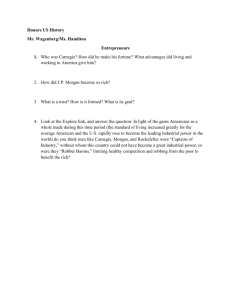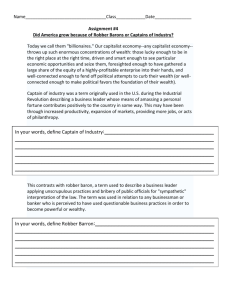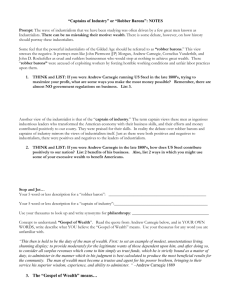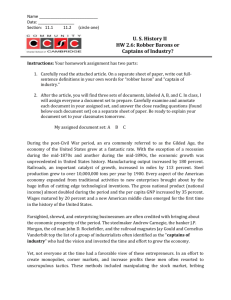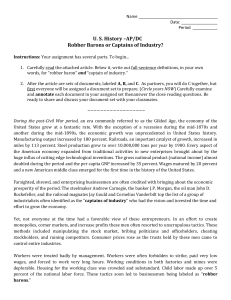File - Mr. Tickler's Class
advertisement
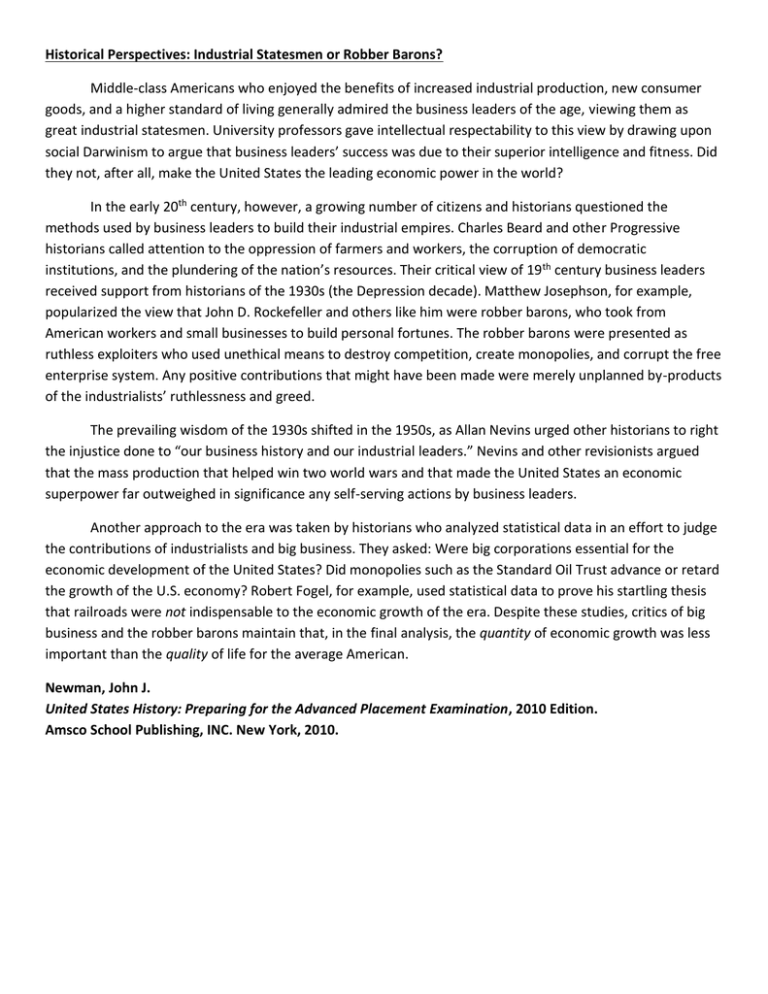
Historical Perspectives: Industrial Statesmen or Robber Barons?
Middle-class Americans who enjoyed the benefits of increased industrial production, new consumer
goods, and a higher standard of living generally admired the business leaders of the age, viewing them as
great industrial statesmen. University professors gave intellectual respectability to this view by drawing upon
social Darwinism to argue that business leaders’ success was due to their superior intelligence and fitness. Did
they not, after all, make the United States the leading economic power in the world?
In the early 20th century, however, a growing number of citizens and historians questioned the
methods used by business leaders to build their industrial empires. Charles Beard and other Progressive
historians called attention to the oppression of farmers and workers, the corruption of democratic
institutions, and the plundering of the nation’s resources. Their critical view of 19 th century business leaders
received support from historians of the 1930s (the Depression decade). Matthew Josephson, for example,
popularized the view that John D. Rockefeller and others like him were robber barons, who took from
American workers and small businesses to build personal fortunes. The robber barons were presented as
ruthless exploiters who used unethical means to destroy competition, create monopolies, and corrupt the free
enterprise system. Any positive contributions that might have been made were merely unplanned by-products
of the industrialists’ ruthlessness and greed.
The prevailing wisdom of the 1930s shifted in the 1950s, as Allan Nevins urged other historians to right
the injustice done to “our business history and our industrial leaders.” Nevins and other revisionists argued
that the mass production that helped win two world wars and that made the United States an economic
superpower far outweighed in significance any self-serving actions by business leaders.
Another approach to the era was taken by historians who analyzed statistical data in an effort to judge
the contributions of industrialists and big business. They asked: Were big corporations essential for the
economic development of the United States? Did monopolies such as the Standard Oil Trust advance or retard
the growth of the U.S. economy? Robert Fogel, for example, used statistical data to prove his startling thesis
that railroads were not indispensable to the economic growth of the era. Despite these studies, critics of big
business and the robber barons maintain that, in the final analysis, the quantity of economic growth was less
important than the quality of life for the average American.
Newman, John J.
United States History: Preparing for the Advanced Placement Examination, 2010 Edition.
Amsco School Publishing, INC. New York, 2010.
DBQ – Industrial Leaders
To what extent is it justified to characterize the industrial leaders of the
1865-1900 era as either “robber barons” or “industrial statesmen”?
DOCUMENT A
Q: How is the freight and passenger pool working?
W.V.: Very satisfactorily. I don’t like that expression “pool,” however, that’s common construction applied by the people to a
combination which the leading roads have entered into to keep rates at a point where they will pay dividends to the stockholders.
The railroads are not run for the benefit of the “dear public” – that cry is all nonsense – they are built by men who invest their
money and expect to get a fair percentage on the same.
Q: Does your limited express pay?
W.V.: No; not a bit of it. We only run it because we are forced to do so by the action of the Pennslyvania road. It doesn’t pay
expenses. We would abandon it if it was not for our competitor keeping its train on.
Q: But don’t you run for the public benefit?
W.V.: The Public be damned. What does the public care for the railroads except to get as much out of them for as small
consideration as possible? I don’t take any stock in this silly nonsense about working for anybody’s good but our own….
Interview with William H. Vanderbilt
Chicago Daily News, October 9, 1882
DOCUMENT B
My laboratory will soon be completed….I will have the best equipped and largest Laboratory extant, and the facilities
incomparably superior to any other for rapid and cheap development of an invention, and working it up into Commercial shape with
models, patterns and special machinery. In fact there is no similar institution in Existence. We do our own castings and forgings. Can
build anything from a ladys watch to a Locomotive.
The Machine shop is sufficiently large to employ 50 men and 30 men can be worked in other parts of the works. Invention
that formerly took months and cost a large sum can now be done in 2 or 3 days with very small expense, as I shall carry a stock of
almost every conceivable material of every size, and with the latest machinery a man will produce 10 times as much as in a
laboratory which has but little material, not of a size, delays of days waiting for castings and machinery not universal or modern….
You are aware from your long acquaintance with me that I do not fly any financial Kites, or speculate, and that the works I
control are well managed. In the early days of the shops it was necessary that I should largely manage them (alone), first because
the art had to be created, 2nd, because I could get no men who were competent in such a new business. But soon as soon as it was
possible I put other persons in charge. I am perfectly well aware of the fact that my place is in the Laboratory; but I think you will
admit that I know how a shop should be managed and also know how to select men to manage them.
Letter from Thomas Alva Edison
November 14, 1887, Edison Laboratory
West Orange, New Jersey
DOCUMENT C
The problem of our age is the proper administration of wealth so that the ties of brotherhood may still bind together the
rich and poor in harmony. The conditions of human life have been revolutionized within the past few hundred years. The contrast
between the palace of the millionaire and the cottage of the laborer with us today measures the change which has come with
civilization.
This change, however, is not to be deplored, but welcomed as highly beneficial. It is essential for the progress of the race
that the houses of some should be homes for all that is highest and best in literature and the arts, rather than none should be so.
Much better this great inequity than universal squalor.
The price which society pays for the law of competition, like the price it pays for cheap comforts and luxuries, is also great;
but the advantages of this law are also greater still. For it is to this law that we owe out wonderful material development which
brings improved conditions. While the law may be sometimes hard for the individual, it is best for the race, because it insures the
survival of the fittest in every department. We welcome, therefore, as conditions to which we must accommodate ourselves, great
inequality of environment, the concentration of business, industrial and commercial in the hands of the few; and the law of
competition between these, as being not only beneficial, but essential for the future progress of the race.
Andrew Carnegie
“Wealth,” North American Review, 1889
DOCUMENT D
It is clear that trusts are contrary to public policy and hence in conflict with the common law. They are monopolies
organized to destroy competition and restrain trade….
It is contended by those interested in trusts that they tend to cheapen production and diminish the price of the article to
the consumer….Trusts are speculative in their purpose and formed to make money. Once they secure control of a given line of
business, they are masters of the situation and can dictate to the two great classes with which they deal – the producer of the raw
material and the consumer of the finished product. They limit the price of the raw material so as to impoverish the producer, drive
him to a single market, reduce the price of every class of labor connected with the trade, throw out of employment large numbers of
persons who had before been engaged in a meritorious calling and finally…they increase the price to the consumer….
The main weapons of the trust are threats, intimidation, bribery, fraud, wreck, and pillage. Take one well-authenticated
instance in the history of the Oat Meal Trust as an example. In 1887 this trust decided that part of their mills should stand idle. They
were accordingly closed. This resulted in the discharge of a large number of laborers who had to supper in consequence. The mills
which continued in operation would produce seven million barrels of meal during the year. Shortly after shutting down, the trust
advanced the price of meal one dollar per barrel, and the public was forced to stand the assessment. The mills were more profitable
when idle than when in operation.
James Weaver
A Call to Action, 1892
DOCUMENT E
I say that you ought to get rich, and it is your duty to get rich. How many of my pious brethren say to me, “Do you, a
Christian minister, spend your time going up and down the country advising young people to get rich, to get money?” “Yes, of course
I do.” They say “Isn’t that awful! Why don’t you preach the gospel instead of preaching about man’s making money?” “Because to
make money honestly is to preach the gospel.” The men who get rich may be the most honest men you find in the community….
Let me say here clearly, and say it briefly…that ninety-eight out of one hundred of the rich men in America are honest. That
is why they are rich. That is why they are trusted with money. That is why they carry on great enterprises and find plenty of people
to work with them. It is because they are honest men….
Russell H. Conwell
Acres of Diamonds, 1900
DOCUMENT F
DOCUMENT G
The captains of industry and the capitalists…if they are successful, win, in these days, great fortunes in a short time. There
are no earnings which are more legitimate or for which greater services are rendered to the who industrial body. The popular
notions about this matter really assume that all the wealth accumulated by these classes of persons would be here just the same if
they had not existed. They are supposed to have appropriated it out of the common stock. This is so far from being the truth that, on
the contrary, their own wealth would be but for themselves; and besides that, millions more of wealth, manifold greater than their
own, scattered in the hands of thousands, would not exist but for them.
William Graham Sumner,
Forum, March 1894
DOCUMENT H
List of major gifts given by John D. Rockefeller by the time of his death in 1937.
American Baptist Foreign Mission Society,New York City
$6,845,688.52
American Baptist Home Mission Society, New York City
$6,994,831.62
American Baptist Missionary Society, Dayton, Ohio
$1,902,132.58
General Education Board
$129,209,167.10
Laura Spelmen Rockefeller Memorial, New York
$73,985,313.77
Minister and Missionaries Benefit Board of Northern Baptists Convention
$7,090,579.06
Rockefeller Foundation, New York
$182,851,480.90
Rockefeller Institute for Medical Research
$59,931,891.62
University of Chicago, Chicago, Illinois
$34,708,375.28
Yale University, New Haven
$1,001,000.00
Y.M.C.A., International Committee
$2,295,580,.73
[TOTAL: $506,816,041.73]
New York Times, May 24, 1937
DBQ: Industrial Leaders ~ In Depth Essay Outline
I.
Introduction
a. Context: Famous American author Mark Twain is often credited with popularizing the term the
“Gilded Age” to describe the combination of outward wealth and dazzle with inner corruption and
poverty that existed in the Industrial Era in the last half of the 19 th century. The years following the
conclusion of the Civil War in 1865 to the turn of the century in 1900 were some of the most
dynamic in American history.
b. Arguments: Technological advances and large-scale production methods coupled with an
abundance of resources and workers stimulated the rise of industrial capitalism in the United
States. The most successful business leaders of the time capitalized on the rapidly changing
economy to maximize profits and increase production of goods and services that would benefit the
majority of Americans. Yet these “industrial statesmen” were not without criticism as economic
and social divisions, as opponents described these men as “Robber Barons” who took from
American workers.
c. Claim: While these industrial leaders promoted an increase in wealth and opportunities along
with a higher standard of living for most Americans, their tactics often exacerbated the gap
between the rich and poor, intensified labor disputes, and raised concerns over political
corruption and the environment.
II.
Body Paragraph #1 = Increased Production and Wealth
a. Topic Sentence (TS): Businesses made use of technological innovations, access to resources, and
management structures to increase the production of goods.
Evidence (E): light bulb, electricity, Menlo Park, Ford, Assembly Line, Model T, telegraph,
typewriter, telephone
Document (D): Edison Letter (Doc. B) “…ladys watch to a Locomotive…” and “…to employ 50
men and 30 men…”
E: George Westinghouse, Frederick Taylor, Mass production, marketing
III.
Body Paragraph #2 = Standard of Living
a. TS: The increasing access and availability of goods and services improved the standard of living
for most Americans.
E: Railroad Industry, Bessemer Process, Carnegie’s U.S. Steel, cameras, pens, indoor
plumbing, safety razors, Macy’s, Marshall Fields, Sears, Montgomery Ward, catalog
shopping, Kellogg, processed food, refrigeration
D: Carnegie, “Wealth” (Doc. C) “The conditions of human life have been revolutionized.”
D: William Graham Sumner, Forum (Doc. G) “…millions more of wealth…scattered in the
hands of thousands, would not exist but for them.”
IV.
Body Paragraph #3 = Class Division
a. TS: Despite these social advances, corporate consolidation and a support from the government
resulted in the concentration of wealth and a widening gap between the rich and the poor.
E: Horizontal and Vertical Integration, Pools, Trusts, Monopolies
D: James Weaver, A Call to Action (Doc. D) “It is clear that trusts are contrary to public
policy…” and undemocratic
D: Standard Oil Co. Cartoon (Doc. F) depicts the monopoly as an octopus-like creature
grabbing other companies, workers, banks, etc demonstrating the reach and power of
Rockefeller’s Company
E: JP Morgan, Panic of 1893, Jay Gould, speculators, Vanderbilts
V.
Body Paragraph #4 = Divided Opinions
a. TS: While some argued that laissez faire policies and competition promoted economic growth,
justifications of corporate wealth were met with a variety of questions from the public and
political spheres.
Adam Smith’s Wealth of Nations, capitalism,
D: Vanderbilt Interview (Doc. A) “Public be damned…”
E: Social Darwinism, Philanthropy, Carnegie’s Gospel of Wealth, philanthropy
D: Carnegie, “Wealth” (Doc. C) “…it insures the survival of the fittest…”
D: Rockefeller’s Major Gifts (Doc. H) shows that he gave back to support religious groups,
education, science, community programs
E: Rags to Riches, Horatio Alger
D: Russell H. Conwell, Acres of Diamonds (Doc. E) religion, honesty, and hard work are
characteristics of successful men
E: Sherman Anti-Trust Act, U.S. v. E.C. Knight Co
VI.
Body Paragraph #5 = Labor Disputes
a. TS: See “Rise of Unions” LEQ
VII.
Conclusion Statement: The innovations and titans of industry symbolized the tremendous change,
wealth and opportunity of the Industrial Era, setting the standard for the growth of corporate
capitalism in modern America. At the same time the greed, corruption, and destruction that resulted
from this change would confound and plague the nation for decades and coupled with continuation of
American expansion and the acquisition of an overseas empire would propel the United States into a
leading economic and political power in the 20th century.
Here are three examples of paragraphs that refer to selected documents for the DBQ. Which paragraph
most skillfully integrates the writer’s background knowledge with use of the documents?
Writer One: Most industrialists, like Carnegie and Rockefeller, were honest men, working for the good of
American society. Russell Conwell in Document E supports this position: “Let me say here clearly, and say it
briefly…that ninety-eight out of one hundred of the rich men in America are honest. That is why they are rich.
That is why they are trusted with money.” William Sumner in Document G expresses similar views: “The
captains of industry and the capitalists…if they are successful, win, in these days, great fortunes in a short
time. There are no earnings which are more legitimate or for which greater services are rendered to the whole
industrial body.” The steel king Andrew Carnegie himself, in Document C, cites “the law of competition
between these, as being not only beneficial, but essential for the future progress of the race.”
Comments:
{Little to no connection of outside evidence beyond the documents; Quotes are far too lengthy, author should try to paraphrase and
explain the documents meaning in their own words; does not source, NEVER SAY IN DOCUMENT B, just don’t do it please}
Writer Two: The concentration of business and wealth deeply divided the nation in the late 1800s. Business
leaders such as Rockefeller and Carnegie believe that unrestrained competition produced more benefits for
society than harm. Carnegie in his famous article, “Wealth,” argued the advantages of competition: “For it is
this law that we owe our wonderful material development which brings improved conditions. While the law
may be sometimes hard for the individual, it is best for the race….” (Document C) Populist leader James
Weaver, however, saw the consolidation of business into trusts as impoverishing workers, consumers, and
especially farmers. The example of the downsizing of the Oat Meal Trust to increase profits proved the
“robber barons” were more interested in increased profits than benefits to society. (Document D)
Comments:
{author does a better job sourcing the document by giving background context or a description of the author and his point of view;
quotes at times still a bit lengthy in Carnegie document, but better analysis on Weaver}
Writer Three: The admiration of business leaders as “industrial statesmen” was supported by the intellectual
movements of the times. Social philosophers of the 19th century, such as Herbert Spencer, applied Charles Darwin’s
theories of natural selection and survival of the fittest to the marketplace. Social Darwinists, such as William Graham
Sumner, argued that society and the economy benefited from unrestrained competition (Document G). While the
“captains of industry” accumulated vast personal fortunes, they also enriched society with a higher standard of living,
improved technology, and more jobs. The Gospel of Wealth popularized by Andrew Carnegie in “Wealth” (Document D)
and Russell Conwell in Acres of Diamonds (Document E) made the accumulation of wealth not only respectable, but also
a moral duty. Industrial leaders such as Carnegie and Rockefeller acted on these beliefs by returning hundreds of
millions of dollars back to society in the form of libraries, universities and other public institutions. Their philanthropic
efforts often provided society with the tools and supports to work their way up the economic ladder rather than simply
acting as handouts to the poor.
Comments:
{Author uses very short quotations or rather explains the author’s main idea; strong connections to historical context and use of
evidence to relate to the document evidence; makes strong connections between the documents; paragraph proves an overall topic
sentence}
